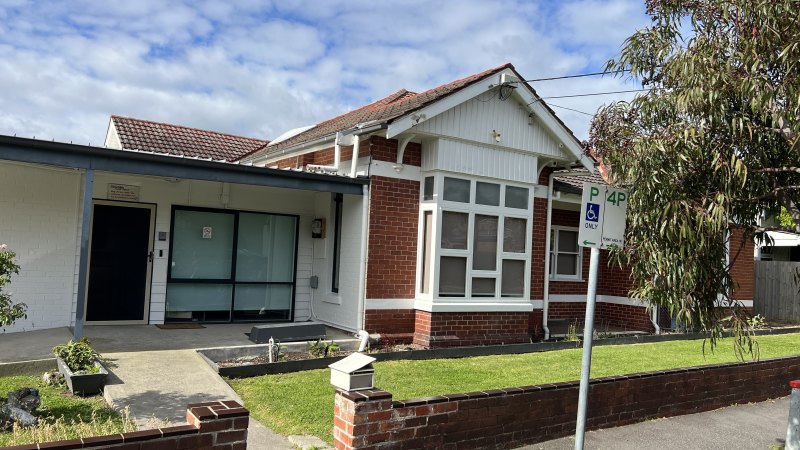Save articles for later
Add articles to your saved list and come back to them any time.
St Kilda will become home to the state’s second sobering-up centre once Victoria’s decriminalisation of public drunkenness laws comes into effect on Melbourne Cup day.
Residents in Mitchell Street were letterboxed on Friday with a flyer from the Department of Health stating that Ngwala Willumbong Aboriginal Corporation would establish a sobering-up service nearby for First Nations people.
The site of Victoria’s second sobering-up centre house at 10 Mitchell Street, St Kilda, which is an existing health facility run by the Ngwala Willumbong Aboriginal Corporation.
“A dedicated sobering service for Aboriginal and Torres Strait Islander people will operate in St Kilda from an existing health service premise that is close to public transport and other health services,” the flyer says.
A Victorian government spokeswoman confirmed the letter’s authenticity on Friday night.
The sobering-up facility will be located at 10 Mitchell Street, which the Ngwala Willumbong Aboriginal Corporation already operates as a clinical service centre according to the Salvation Army’s crisis referral system.
A separate Ngwala Willumbong Aboriginal Corporation letter to residents, also seen by The Age, said the Aboriginal community-controlled organisation would start a public intoxication response program in four days once public drunkenness was decriminalised.
It said the culturally safe centre would operate 24/7 and be staffed by outreach workers, alcohol and other drug workers, Aboriginal health practitioners and Elders.
The Victorian government’s website says six beds were planned at a sobering-up centre for Aboriginal and Torres Strait Islander people in addition to a larger centre for the general public.
This masthead revealed in August that Victoria’s first sobering-up centre would be a 20-bed facility in Collingwood.
The state opposition – which supports the decriminalisation of public drunkenness – proposed legislation in Victorian parliament this week to delay the reform from taking effect next Tuesday, claiming the Collingwood centre won’t be ready.
Sobering-up centres were proposed in 2020 as part of the move towards treating public intoxication as a health issue rather than a police matter, a reform committed to by the government after the death of Yorta Yorta woman Tanya Day in police custody in December 2017. She had been arrested on a train while intoxicated.
Indigenous groups have long called for public drunkenness law reform, arguing public intoxication offences particularly harmed First Nations people.
Decriminalisation was recommended in the Royal Commission into Aboriginal Deaths in Custody in 1991. Victoria and Queensland are the only Australian states or territories that consider public drunkenness an offence.
Victoria’s decriminalisation this month means outreach services will support people who are drunk in a public space and, if needed, transport them to a safe place to rest and sober up.
The government said that for most people, that would be their own home or that of friends or family, but for others it would be a sobering-up centre, if they consent.
Police Association Victoria secretary Wayne Gatt has previously lashed the government’s public drunkenness law reform rollout as reckless, arguing it doesn’t have a plan if intoxicated people refuse help from a health service.
Mental Health Minister Ingrid Stitt said in a statement on Friday night that “police and paramedics will continue to help Victorians as they normally would in instances where there are emergency health or community safety risks”.
“Simply being intoxicated in public shouldn’t be a crime. And from Tuesday, it won’t be,” Stitt said.
“We know people shouldn’t end up in a police cell just for being intoxicated. But for a disproportionately high number of First Nations people, that’s long been the reality.”
Community health provider cohealth will run the sobering-up centre at 3 Cambridge Street in Collingwood, which has been opposed by some nearby residents who have complained about a lack of consultation from the government.
The government says the first centre’s location was chosen because of its proximity to the CBD, public transport and St Vincent’s Hospital.
Melbourne’s first sobering-up centre will have capacity for 140 people a week when public drunkenness is decriminalised from November 7, but tender documents seen by The Sunday Age suggest the centre’s capacity could be strained if the public drunkenness changes lead to major diversions of low-risk patients away from hospitals.
The Ngwala Willumbong Aboriginal Corporation has been contacted for comment.
Our Breaking News Alert will notify you of significant breaking news when it happens. Get it here.
Most Viewed in National
From our partners
Source: Read Full Article

